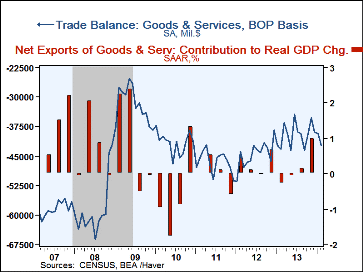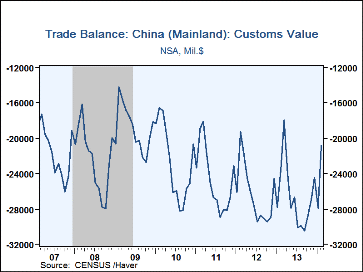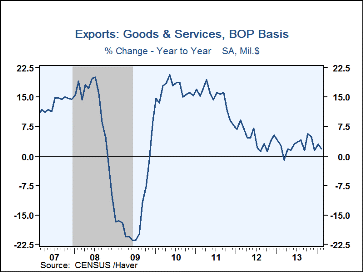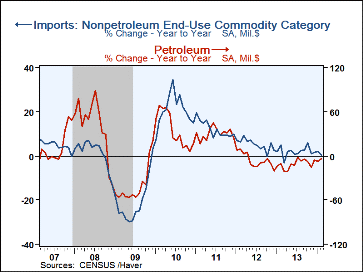 Global| Apr 03 2014
Global| Apr 03 2014U.S. Trade Deficit Deepens Unexpectedly but Deficit With China Narrows Significantly
by:Tom Moeller
|in:Economy in Brief
Summary
The U.S. foreign trade deficit of $42.3 billion in February compared to $39.3 billion in January, last month reported as $39.1 billion. A $39.0 billion deficit had been expected in the Action Economics Forecast Survey. The deficit's [...]
The U.S. foreign trade deficit of $42.3 billion in February compared to $39.3 billion in January, last month reported as $39.1 billion. A $39.0 billion deficit had been expected in the Action Economics Forecast Survey. The deficit's deepening owed to a 1.1% decline (+1.9% y/y) in exports, the second decline in the last three months. Imports rose 0.4% (1.1% y/y). In chained 2009 dollars, the deficit in goods deteriorated in February to $50.1 billion from $48.4 billion. Real exports of goods fell 1.6% (+1.2% y/y) while real imports slipped 0.2% (+1.1% y/y).
The constant dollar value of exports of industrial supplies and materials declined 6.8% (-2.5% y/y) pulled lower by an 11.7% drop (+3.9%) in petroleum exports. Real capital goods exports fell 2.2% (0.4% y/y) and real exports of foods feeds & beverages were off by 2.0% (+6.7% y/y). To the upside, real exports of nonauto consumer goods rose 8,4% (12.9% y/y) and real auto exports gained 0.9% (-1.6% y/y). Services exports were unchanged (5.5% y/y). Travel exports slipped 0.1% (+7.2% y/y) but the dollar's value encouraged U.S. visits. Passenger fares declined 4.4% (+0.2% y/y).
The value of U.S. petroleum imports declined 2.0% (-3.6% y/y) and the quantity of petroleum product imports fell 0.9% (+0.4% y/y). The price of crude oil gained m/m to $91.53, still down from the $109.69 high reached in April 2012. In constant dollars, nonpetroleum imports slipped 0.1% (+1.2% y/y). Real automotive imports increased 4.0% (5.0% y/y) while real nonauto consumer goods imports edged 0.2% higher (-1.9% y/y. Real capital goods imports declined 2.4% (+1.6% y/y. Services imports rebounded 2.1% (6.7% y/y). Travel imports slipped 0.1% (+4.6% y/y) but passenger fares increased 1.3% (9.0% y/y).
The February trade deficit in goods with mainland China narrowed to $20.9 billion, its least since March 2013. Exports to China jumped 6.2% y/y while imports declined 6.0% y/y. With Japan, the deficit held steady at $5.3 billion. U.S. exports improved 5.7% y/y but imports were down 3.5% y/y. The deficit with the European Union deepened slightly to $9.1 billion. U.S. exports increased 3.6% y/y while imports rose 4.0% y/y.
The international trade data can be found in Haver's USECON database. Detailed figures are available in the USINT database. The expectations figures are from the Action Economics consensus survey, which is carried in the AS1REPNA.
| Foreign Trade (Current Dollars) | Feb | Jan | Dec | Y/Y | 2013 | 2012 | 2011 |
|---|---|---|---|---|---|---|---|
| U.S. Trade Deficit | $42.3 bil. | $39.3 bil. | $39.0 bil. | $42.3 bil. (2/13) |
$474.9 bil. | $534.7 bil. | $556.8 bil. |
| Exports (%) | -1.1 | 0.6 | -1.7 | 1.9 | 2.8 | 4.6 | 14.5 |
| Imports | 0.4 | 0.6 | 0.2 | 1.1 | 0.0 | 2.8 | 13.9 |
| Petroleum | -2.0 | 8.9 | 2.1 | -3.6 | -10.9 | -5.6 | 30.7 |
| Nonpetroleum goods | 0.2 | -0.5 | -0.4 | 0.5 | 2.0 | 5.2 | 12.1 |
Tom Moeller
AuthorMore in Author Profile »Prior to joining Haver Analytics in 2000, Mr. Moeller worked as the Economist at Chancellor Capital Management from 1985 to 1999. There, he developed comprehensive economic forecasts and interpreted economic data for equity and fixed income portfolio managers. Also at Chancellor, Mr. Moeller worked as an equity analyst and was responsible for researching and rating companies in the economically sensitive automobile and housing industries for investment in Chancellor’s equity portfolio. Prior to joining Chancellor, Mr. Moeller was an Economist at Citibank from 1979 to 1984. He also analyzed pricing behavior in the metals industry for the Council on Wage and Price Stability in Washington, D.C. In 1999, Mr. Moeller received the award for most accurate forecast from the Forecasters' Club of New York. From 1990 to 1992 he was President of the New York Association for Business Economists. Mr. Moeller earned an M.B.A. in Finance from Fordham University, where he graduated in 1987. He holds a Bachelor of Arts in Economics from George Washington University.
More Economy in Brief
 Global| Feb 05 2026
Global| Feb 05 2026Charts of the Week: Balanced Policy, Resilient Data and AI Narratives
by:Andrew Cates










